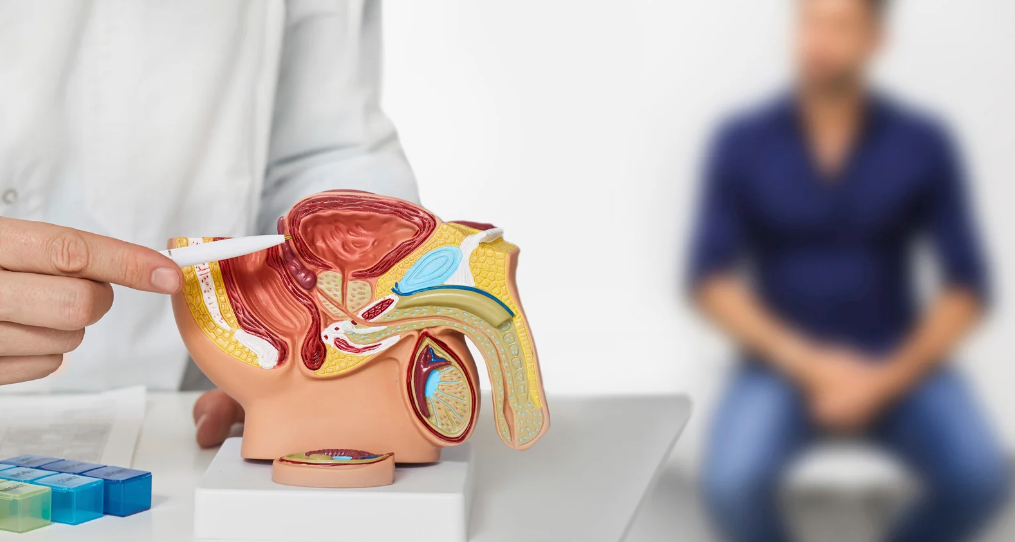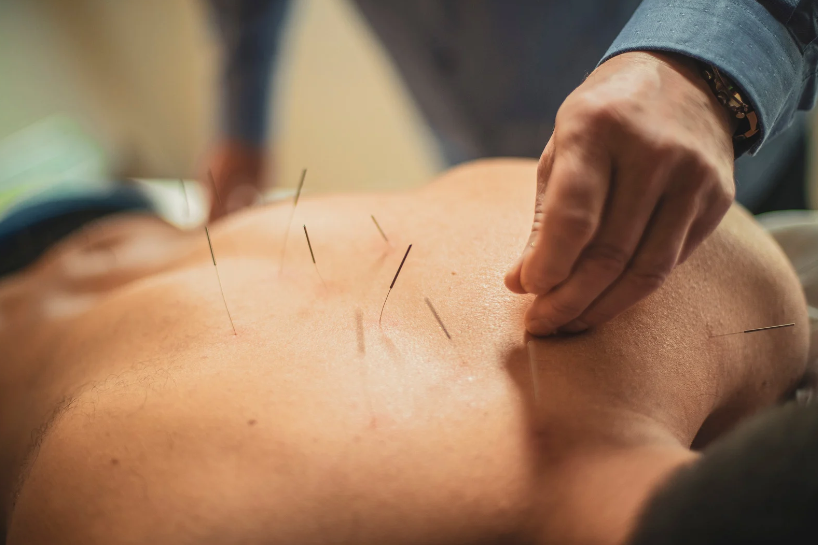Men can achieve a balanced and proactive approach to prostate wellness by combining these natural treatments with frequent medical check-ups.
In this blog, we will discuss enlarged prostate natural remedies so you can try them at home.
What is an Enlarged Prostate?
An enlarged prostate, commonly known as benign prostatic hyperplasia (BPH), is a prostate gland enlargement. In men, the prostate gland is a tiny walnut-shaped gland that surrounds the urethra. It is found underneath the bladder and in front of the rectum.
BPH is a frequent condition among elderly men. BPH affects more than half of men between the ages of 51 and 60, according to more research done by the National Institute of Diabetes and Digestive and Kidney Diseases (NIDDK). The incidence rises with age, with over 90% of men aged 85 and older experiencing moderate symptoms of BPH symptoms.
Some men have no symptoms of an enlarged prostate. When signs and symptoms appear, they frequently include:
- Urge to urinate often at night (nocturia)
- Starting urination is difficult.
- Weak urine flow
- Dribbling after urinating
- attempting to urinate
- Inability to empty the bladder entirely
- Urination regularly
- The need to urinate is pressing.
- Hematuria (blood in the pee)
- Urinary stones
- Urge to urinate suddenly
- Dysuria is the sensation of pain or burning during urination.
Causes and Risk Factors

Natural age-related changes in hormone levels and cell proliferation frequently create an enlarged prostate. Among the primary risk factors for prostate cancer are:
Age
With age, the likelihood of benign prostatic hyperplasia rises. Over 50% of males develop benign prostatic hyperplasia prostate enlargement by the age of 60. By the age of 85, this figure had risen to more than 90%.
Hormone Changes
The prostate gland relies on androgens, particularly testosterone, to operate effectively. As men become older, their androgen levels fall while their estrogen levels rise, resulting in an imbalance that can contribute to prostate enlargement.
Obesity
Obese men are more likely to get BPH, according to research. Although the specific cause is unknown, obesity is linked to increased inflammation and hormonal changes that may lead to prostate enlargement.
Genetics
A man’s risk of some BPH symptoms increases if he has a blood relative who has had prostate cancer or problems. Prostate cell development may be influenced by genetics. Men who have a sibling or parent who has BPH are twice as likely to have the ailment themselves.
Conventional Treatments
Medication and surgery are common medical treatments for an enlarged prostate (benign prostatic hyperplasia, or BPH).
Medications
Alpha-blockers and 5-alpha reductase inhibitors are the two most popular forms of BPH treatments.
To enhance urine flow and minimize BPH symptoms, alpha-blockers relax the muscular tissue in the prostate and bladder neck.
5-alpha reductase inhibitors act by preventing testosterone from being converted into DHT, which leads to prostate development. Finasteride (Proscar) and dutasteride (Avodart) are two examples.
To be successful, these drugs must be used on a long-term basis. Dizziness, headaches, sexual dysfunction, and other side effects are possible.
Surgery
Surgical techniques may be considered if medicines are ineffective. Among other treatments, the most common surgical treatment options used are:
- Transurethral resection of the prostate (TURP): Prostate tissue is removed through the urethra. This is the most common and successful surgical therapy for treating BPH alone.
- Laser procedures: Prostate tissue is removed using laser light. Photovaporization of the prostate (PVP) and holmium laser ablation of the prostate (HoLAP) are two treatment options.
The procedure of making tiny cuts in the prostate to alleviate pressure on the urethra is known as transurethral incision of the prostate (TUIP). When compared to TURP, this has a lesser chance of adverse effects.
- Transurethral microwave treatment (TUMT) is a method of shrinking enlarged prostate tissue by using microwave heat radiation.
- An open prostatectomy is the surgical removal of enlarged prostate tissue through an abdominal incision. This is reserved for really big prostates.
Bleeding, infection, sexual and erectile dysfunction symptoms, urine incontinence, and retrograde ejaculation are all concerns associated with surgery. Patients must consider these dangers against the possibility of symptom improvement.
Best Natural Remedies for Enlarged Prostate
Lifestyle Changes
How to shrink enlarged prostate naturally? Certain lifestyle changes can help ease enlarged prostate symptoms and may even diminish enlarged prostate gland size.
Diet
For a home remedy for enlarged prostate, A healthy, balanced diet rich in fruits, vegetables, and whole grains may aid in the prevention of prostate enlargement. Avoiding processed meals, saturated fats, and extra calories can also help to maintain testosterone levels. Consider the following dietary changes:
- Incorporate more tomatoes, berries, seafood, nuts, seeds, green tea, and pomegranate juice into your diet. These meals are high in antioxidants and nutrients, which may help safeguard prostate health.
- Reduce your intake of dairy, red meat, and high-fat meals, which may aggravate your symptoms.
- Stay hydrated by drinking water rather than coffee or alcohol, both of which can irritate the prostate.
Exercise
Regular aerobic exercise and strength training aid in weight management, mood enhancement, stress reduction, and blood circulation improvement. Aim for 30 minutes of moderate activity every day, such as walking, swimming, or cycling.
Activities that strengthen pelvic muscles, such as Pilates and yoga, can also help to alleviate the symptoms of an enlarged prostate.
Stress Management
Chronic stress alters hormone levels, which may contribute to prostate growth. Meditation, deep breathing, massage treatment, tai chi, and listening to music are all relaxation activities that help trigger the body’s relaxation response and reduce stress hormone levels.
Getting enough sleep and taking brief breaks during the day might also assist with stress management. For stress caused by psychological causes, consider therapy or support groups.
Which herbs shrink the prostate?
Several herbs for prostate are thought to help reduce the size of an enlarged prostate (BPH). Notable options include:
Pygeum
Pygeum is derived from the bark of an African plum tree. It includes plant sterols, which are supposed to aid in the reduction of inflammation and urinary blockages caused by an enlarged prostate.
According to research, pygeum can help reduce nocturnal urination, enhance urine flow, and ease urinary symptoms associated with an enlarged prostate. It may take a few weeks to realize the positive benefits.
Pygeum bark extract comes in capsules and tablets. When taken correctly, it is regarded as a safe supplement.
Saw Palmetto
Saw palmetto is a plant native to the United States Southeast. Its berries have long been utilized to cure urinary issues.
Saw palmetto is supposed to operate by lowering dihydrotestosterone (DHT), a hormone that promotes prostate development. Saw palmetto has been found in several clinical trials, to successfully treat urinary symptoms associated with an enlarged prostate.
It may take up to 4-6 weeks of usage before you see any results. Saw palmetto supplements are available in the form of capsules, pills, and liquid extracts. It is thought to be safe for long-term usage.
Stinging Nettle
The plant stinging nettle is native to North America, Europe, and Asia. Urinary problems have historically been treated using the root and leaves.
Some studies suggest that stinging nettle, owing to anti-inflammatory actions, helps improve urine flow rates, reduce symptoms, and lessen other symptoms associated with an enlarged prostate.
Stinging nettle root extract is available in the form of capsules or tablets. Although there are few side effects, some persons may develop stomach distress. Before using stinging nettle, as with any herbal product, ask your doctor.
Supplements
Several supplements may help ease the symptoms of an enlarged prostate. Before beginning any new supplements, always consult with your doctor, especially if you are taking other drugs.
Zinc
According to certain research, zinc deficiency may contribute to prostate enlargement. Zinc is crucial for prostate health, and zinc supplements may aid in prostate symptoms through the reduction of prostate size and urinary symptoms.
Typically, the suggested daily dose is 30-45 mg. Zinc can interfere with antibiotics and blood pressure drugs, so talk to your doctor about any potential problems.
Beta-sitosterol
The plant extract beta-sitosterol can be found in seeds, nuts, and legumes. By lowering inflammation and prostate size, it may help alleviate urinary symptoms associated with an enlarged prostate.
Take 60-130 mg daily. Although beta-sitosterol is typically harmless, it may interact with cholesterol medicines.
Quercetin
Quercetin is an antioxidant flavonoid present in foods such as onions and apples. According to a preliminary study, it may assist in enhancing prostate health and urinary function.
The usual dose is 500-1000 mg taken once or twice a day. Some antibiotics and blood thinners may interact with quercetin.
Acupuncture

What natural remedies for enlarged prostate can you try also? Acupuncture may aid with hormone regulation. Hormone imbalances such as testosterone and estrogen are thought to lead to prostate hypertrophy. Acupuncture can assist in balancing these hormones.
It has the potential to alleviate enlarged prostate symptoms and inflammation. An enlarged prostate is commonly caused by inflammation. Acupuncture needles may aid in the reduction of inflammation.
Acupuncture can relax pelvic muscles and regulate nerve activity in bladder muscles. This relaxing action may alleviate urinary problems associated with prostate enlargement, such as difficulties urinating.
Another potential advantage is increased blood flow. Increased circulation in the pelvic area may aid in shrinking an enlarged prostate or slowing its development.
Acupuncture research for an enlarged prostate is minimal. However, preliminary research suggests that it may help reduce bladder discomfort and enhance urine flow. When administered by a certified acupuncturist, it is usually regarded as a safe supplemental therapy. Regular treatments over 4-6 weeks may be required to see the benefits.
Acupuncture should not be used in place of normal medical therapies prescribed by your doctor. However, if you wish to explore natural therapies for prostate relief, it might be a useful add-on therapy to consider. As with any therapy, please consult your healthcare practitioner first to determine that it is appropriate for your specific health situation and needs.
Including BPH Natural Remedy in Your Daily Routine
It is critical to approach what is the best natural remedy for enlarged prostate with a comprehensive mentality. Combining dietary changes, herbal supplements, lifestyle changes, and targeted dietary supplements can result in a complete approach to symptom management.
Frequently asked questions
What is the fastest way to shrink an enlarged prostate naturally?
The most effective natural remedies to shrink your prostate in a matter of seconds involve a mix of lifestyle adjustments, including practices like double voiding, regular exercise, and minimizing fluid consumption before bedtime, along with adhering to a nutritious diet.
What are the best prostate supplements?
When looking for the prostate health supplements, several options stand out:
- Saw Palmetto is widely used for managing symptoms of benign prostatic hyperplasia (BPH), although research on its effectiveness is mixed.
- Beta-Sitosterol has been clinically validated to support urinary health and improve bladder emptying.
- Pumpkin Seed Oil may help alleviate BPH symptoms and support prostate health.
- Nuzena Prostate Support + and DrFormulas Super Prostate Support are comprehensive formulations that combine various beneficial ingredients for prostate health.
Conclusion
Natural remedies for BPH provide a proactive and comprehensive approach to symptom management and overall prostate health. However, it is critical to pursue to what is the best treatment for enlarged prostate with knowledge and in conjunction with healthcare specialists.
If you enjoyed this article, you may also want to read this article on Top Prostate Supplements for Men’s Health.
*This information is not intended to serve as a substitute for professional medical treatment or dietary advice tailored to individual needs.
References:
https://www.niddk.nih.gov/health-information/urologic-diseases/prostate-problems/prostate-enlargement-benign-prostatic-hyperplasia
https://www.ncbi.nlm.nih.gov/pmc/articles/PMC3179830/
https://www.ncbi.nlm.nih.gov/pmc/articles/PMC4789344
https://www.ncbi.nlm.nih.gov/pmc/articles/PMC9638770/
https://www.ncbi.nlm.nih.gov/pmc/articles/PMC2213889/
https://www.ncbi.nlm.nih.gov/books/NBK555930
https://www.ncbi.nlm.nih.gov/pmc/articles/PMC8618879/
https://pubmed.ncbi.nlm.nih.gov/9827786/
https://pubmed.ncbi.nlm.nih.gov/15911913/
https://pubmed.ncbi.nlm.nih.gov/11869585/
https://www.ncbi.nlm.nih.gov/pmc/articles/PMC6859144/
https://www.ncbi.nlm.nih.gov/pmc/articles/PMC3589769/
https://www.ncbi.nlm.nih.gov/pmc/articles/PMC7424038/
https://pubmed.ncbi.nlm.nih.gov/10796740/
https://www.ncbi.nlm.nih.gov/pmc/articles/PMC5380320/




